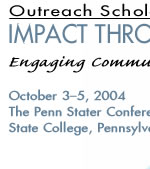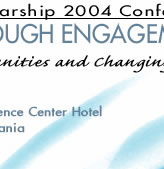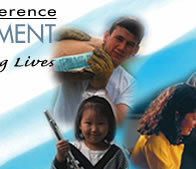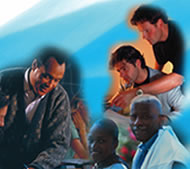Developing
Science Outreach Programs That Appeal to Sponsors, Staff,
and Students and Offer Maximum Impact of State Science
Learning Competencies
Megan
D. Moses, Program and Outreach Director, Environmental
Molecular Science Institute, Ohio State University
The
Environmental Molecular Science Institute at Ohio State
has implemented numerous Outreach Programs that provide
students grades 4-16 the opportunity to conduct unique
research experiments. These programs appeal to sponsors,
staff, and students. Learn strategies to develop outreach
programs that appeal to sponsors and are meaningful
and enjoyable to staff and students.
The
Impact of Transformative Partnerships on Extension Engagement
Nancy K. Franz, Associate Director, University
of New Hampshire
Extension
partnerships can enhance engagement through effective
problem solving and adaptation to change. Working in
partnership is difficult and often requires transformative
learning for successful engagement. This research examines
how successful partnerships use learning to transform
and engage individuals, partners, and organizations.
Common conditions for transformative learning are identified.
Measuring Impact and Reshaping the Model of an Outreach
Program to Virginia's Technology Companies
Edward
L. Nelson, Director of Outreach Programs, Virginia
Tech--College of Engineering, Virginia Tech
Participates
in an outreach program to small businesses in Virginia,
to help them obtain federal contracts for the development
and commercialization of new technologies. The presentation
will explain how the outreach program was reshaped as
a result of an impact assessment which incorporated
input from multiple diverse stakeholders.
Outreach through Watershed Education: Partnering
within a School, Community, and Watershed
George R. Vahoviak, Affiliate Assistant Professor/Program
Director, Penn State
This
PowerPoint presentation will illustrate the working
progress of a Penn State Outreach program, aimed at
improving the quality of a local watershed, which links
academics, research, and service. The project focuses
on the watershed's past, present, and future through
education, community involvement, and collaboration
between schools, landowners, civic organizations, and
representation of government.
Mini Medical School: A Prescription for Community Engagement
in Health Care Issues and Research
Luanne E . Thorndyke, Associate Dean for Professional
Development, Penn State College of Medicine
Josephine M. Carubia, Chief Academic Liaison
Officer, Penn State College of Medicine
Bonnie J. Bixler, Director of Special Projects,
Penn State College of Medicine
The
"Mini Medical School" is a high-impact community
program created by the College of Medicine. Goals of
the program are to enhance the pipeline for health care
professionals, to respond to the general public's intense
desire for health and medical information, and to educate
the community about biomedical science and the translation
of medical research to clinical treatments.
Rib Lake Submerged Log Project: People and the University--A
Partnership for Progress
Arlen
E. Albrecht, Associate Professor of Community Development,
University Of Wisconsin-Extension
UW-Extension's county-based faculty are often sought
out to assist in small rural communities projects. This
session reviews a unique case of building community
capacity and incorporating other university systems
with their technologies to overcome obstacles and to
assist the Village of Rib Lake in accomplishing their
goal of retrieving highly valuable submerged old-growth
saw logs from the community's lake bottom.
Positioning Research as an Asset to Attract Community
Partners: Washington State's Experience with the Strengthening
Families Program
Louise
A. Parker, Director of Extension Family Programs,
Washington State University
Laura Griner Hill, Assistant Professor, Washington
State University
The
University's research capacity can be a strategic asset
for recruiting community partners. This presentation
will share how a team of extension and research faculty
offered potential partners evaluation services as a
way of bringing an educational program to scale and
building a department-based research agenda simultaneously.
Impacting the Latino Community: Changing Children's
Lives
David A. Knauft, Associate Dean for Academic
Affairs, University of Georgia
Anna K. Scott, Oasis Program Coordinator, University
of Georgia
A
community partnership between the University of Georgia
and a faith-based mission, Oasis Catolico Santa Rafaela,
has created an after-school tutoring program for Hispanic
children. Tutors are graduate and undergraduate students
from the University of Georgia. In our presentation
we discuss the issues we encountered while institutionalizing
this successful program.
Actualizing a Culture of Engaged Scholarship in the
College of Education at the University of Florida
Nancy Fichtman Dana, Professor and Associate
Director, University of Florida
Catherine Emihovich, Professor and Dean, College
of Education, University of Florida
Come
learn concrete strategies for communicating a scholarship
of engagement vision; creating new traditions, rituals,
and symbols to support the vision; and helping faculty
redefine their individual work as engaged scholarship.
Dialogue with presenters and participants about the
problems and possibilities associated with building
an engagement culture at your own institution.
University Engagement Partnerships and Resources--Best
Practices
Allen
D. Varner, Director, Indiana State University
Louis Jensen, Executive Director, Indiana State
University
Nancy Brattain-Rogers, Associate Professor of
Recreation and Sport Management, director of Humanics,
Indiana State University
Participants
will participate in a discussion of the difference between
traditional outreach and the principles of engagement;
organizations, associations, and university engagement
"best practices"; structural models for engagement
within the university; and the implementation of engagement
as an integral function of the university.
The Keystone Project: Engaging Penn State Students and
Faculty with Local Communities and Stakeholders in "Hands-On"
Watershed Stewardship
Charles A. Cole, Associate Director, Center
for Watershed Stewardship, Penn State
Lysle Sherwin, Director, Center for Watershed
Stewardship, Penn State
The
Penn State Center for Watershed Stewardship will describe
its Keystone Project process, an integrated education
and outreach program developed to train graduate students
and to provide outreach to the citizens of Pennsylvania's
watersheds. We will describe the process using our experience
from six watersheds in across Pennsylvania.
|





